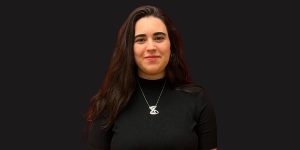Merav Mofaz (married to Amit and soon to be a mother to her first daughter) is a data scientist in Microsoft Israel R&D’s education group, developing AI-based products for advanced and personalized learning. Over the past year, she has led several developments in education, integrating language models (like GPT) into products for teaching reading, improving students’ learning experiences, and easing teachers’ workloads. Mofaz also lectures at Tel Aviv University, conducts professional workshops and training on artificial intelligence, and advises startups.
“My current work and endeavors are a dream come true”, says Merav. “It combines analytical thinking with social and educational involvement. I combine technological knowledge with educational needs from the field to create educational technologies that will assist education teams and students worldwide to learn in a personalized, sensitive, and more efficient way. The combination of technology and social action has driven the choices I’ve made in life. My work advances significant issues that are important to me and creates a positive impact on the world”.
Mofaz studied for her bachelor’s degree in industrial engineering and management and combined studies from the humanities. From there, she continued to a direct Ph.D. track. During her master’s and doctoral studies, she led research using advanced machine learning tools to improve health and quality of life metrics and assist in diagnosing infectious diseases, using data from phones and smart watches. Later, she used this technology after the events of October 7.
“I worked on a paper where I analyzed data from smart watches and phones of nearly 5,000 people”, she says. “In the study, I showed how this data can be used to learn about the psychological effect of the October 7 events. We discovered important findings indicating the negative impact of exposure to media and social networks on mental state. Additionally, we demonstrated the potential of continuous monitoring for early diagnosis of PTSD and providing treatment to those who need it”.
Merav’s research has been published in leading international journals such as Nature, Lancet Respiratory Medicine, and others, and she has presented it at several conferences including the Annual Conference for Quality in Medicine, Women in Data Science, and AI Week.
Formative Challenge
Can you tell us about a crisis you had to deal with?
“When I was 16, I was diagnosed with type 1 diabetes. Paradoxically, since I was a little girl, I had a great fear of needles, so at the first moment I was diagnosed, all that bothered me was how I, who almost faint before a vaccine, would manage with multiple injections every day. The fear of injection was so great that I asked to keep the IV in my vein to save the additional test prick for the next day.
“But after a few hours that I dedicated to learning about the disease and the various solutions for balancing it, I put it in my head that it’s just another action that’s added to the activities I naturally do like breathing, drinking, and eating.
“Very quickly I realized that this was an opportunity to learn about my body, to get motivation to be more active, to eat in a more balanced way, and to find a way to be calm even in stressful periods. In retrospect, I understood that dealing with the disease played a significant part in shaping my choices to engage in data analysis and particularly in medical data. Coping shaped me as a person with positive thinking and a high ability to grow from challenges, while focusing on the opportunities they can create for me”.





